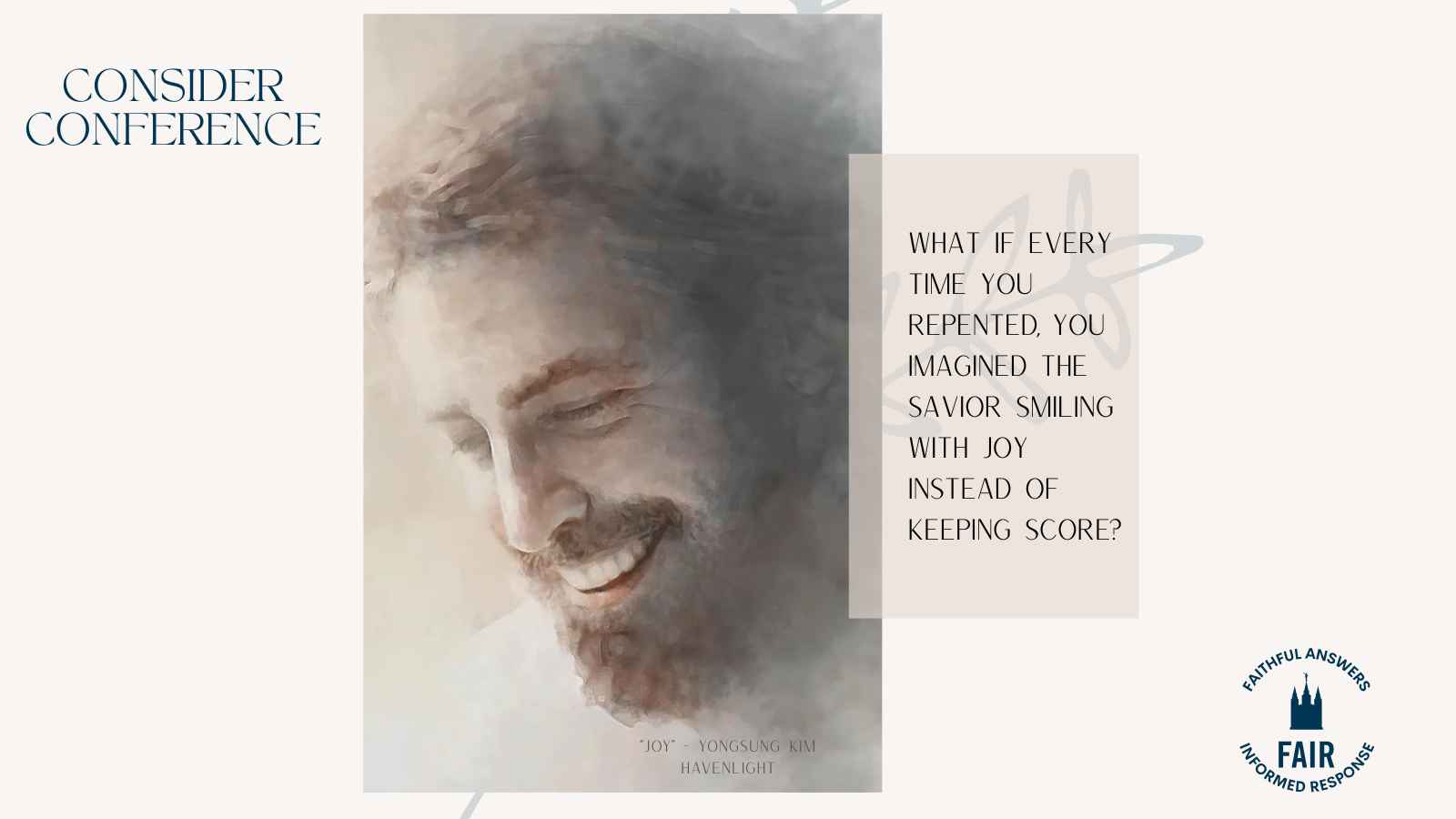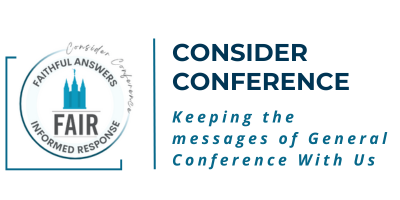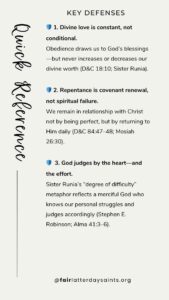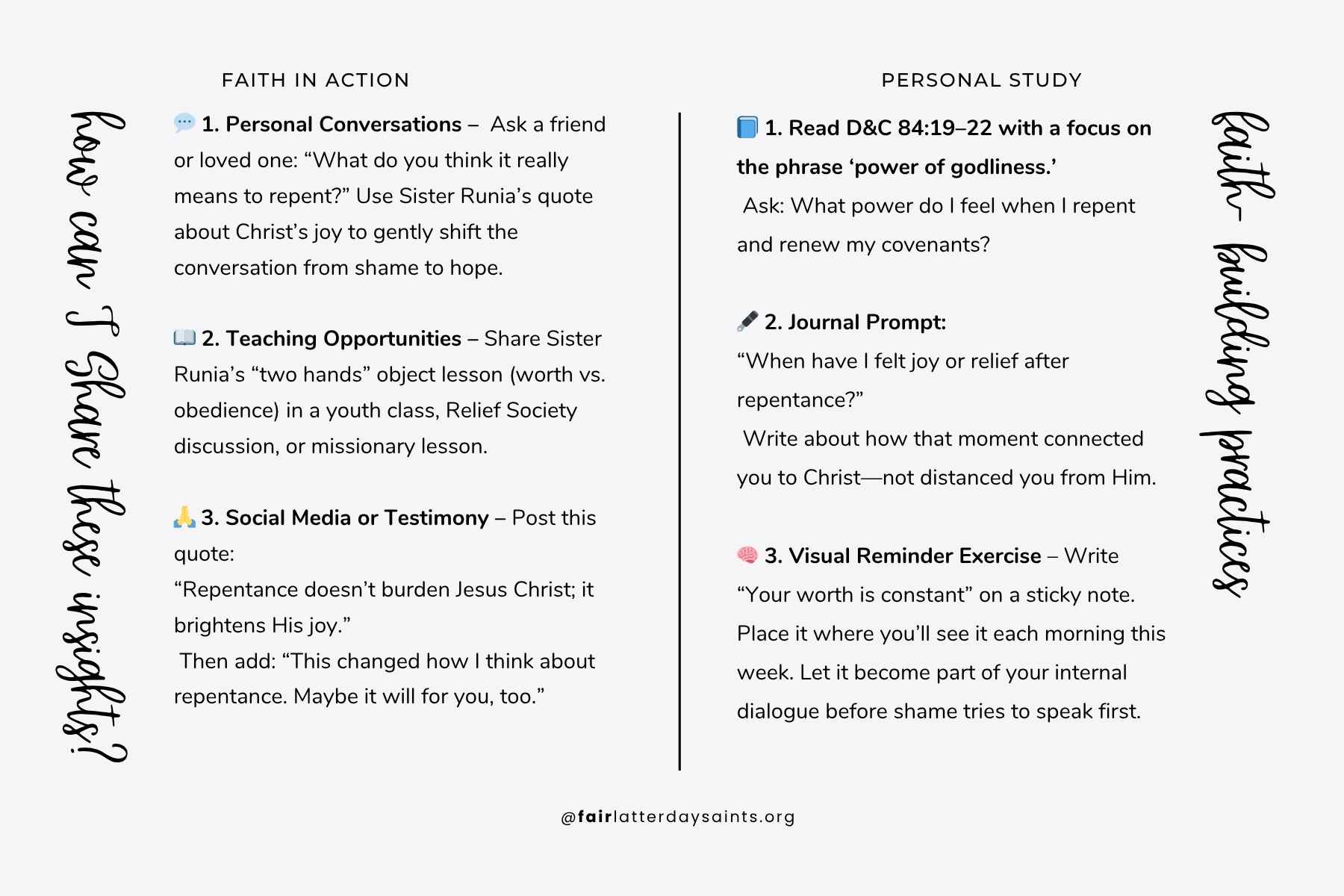Repentance, Worth, and the Real Meaning of Godliness
Have you ever worried that your repentance doesn’t count anymore—because you’ve had to ask for forgiveness again? Or that your standing with God depends on your performance?
In her talk “Your Repentance Doesn’t Burden Jesus Christ; It Brightens His Joy,” Sister Tamara W. Runia offers a powerful message of hope, identity, and covenant belonging. She dismantles perfectionism, reframes repentance as joy, and affirms that God’s love is constant—even when our progress feels slow.
In a world that confuses worth with worthiness, Sister Runia’s testimony is a healing reminder: God delights in your return. Your place in the covenant doesn’t depend on perfection—it depends on choosing Him again. And again.
This week’s Come, Follow Me study of Doctrine and Covenants 84 affirms the same truth: The power of godliness is revealed not through flawlessness, but through covenant connection. That power is extended to all—male and female, strong and struggling—through ordinances, faith, and the Savior’s sustaining grace.

Apologetic Issues: Repentance, Perfectionism, and Divine Worth
Misconception: Repentance as a Burden on Christ – “I shouldn’t need to repent so much. My repeated failures must disappoint Him—or prove I’m just not cut out for this path.”
Response:
This misconception creates a spiritual catch-22: the more you try and fail, the more ashamed you feel—and the more distant you assume Christ must be.
Sister Runia lovingly corrects this idea by reframing repentance not as a burden but as a divine joy:
The Savior loves us always—but especially when we repent.” (quoting President Nelson) “He delights to forgive us, because to Him we are delightful.
Doctrine and Covenants 84:19–22 affirms that “the power of godliness is manifest” through priesthood ordinances. But that divine power is accessed through more than sacred ritual—it begins with sacred desire. Repentance is not an ordinance we perform upon us; it is a principle we live by. It is an active expression of faith in Christ and a vital part of the covenant path.
Rather than disqualifying us, the need to repent signals our willingness to change, our openness to grace, and our readiness to receive God’s power through His ordained ordinances. This distinction matters deeply: it means that repentance is not the evidence we’ve failed to earn divine love—it’s the very way we reach for it.
Common Fallacy: False Cause – A false cause fallacy occurs when a cause is incorrectly identified based on correlation or timing. In this case, some assume:
“If I need to repent again, it must mean I’m a failure—or that God is disappointed in me.”
This reasoning falsely links the repetition of repentance with spiritual unworthiness, as if sincere effort and imperfection are mutually exclusive.
This oversimplifies the purpose of repentance and misrepresents the nature of God’s covenant relationship. Repentance is not evidence that we’ve broken something beyond repair—it’s the way we stay repaired and remain connected to Him.
Solution: Recognizing that repentance is a gift of relationship, not a penalty for weakness, resolves this false cause. It reorients our view: the need to repent doesn’t mean we’re defective—it means we’re devoted. We are choosing Christ again and again, and He rejoices every time.
Social Issue: Latter-day Saints Only Feel Loved When They’re Obedient
Criticism: “Your Church teaches that God’s love is conditional—if you sin or struggle, you’re worth less.”
Response: This is a painful and common concern—not only among critics of the Church, but even among lifelong Latter-day Saints. Many have absorbed the mistaken idea that God’s love increases or decreases depending on our level of obedience. Sister Tamara W. Runia gently but clearly corrects this belief:
Your worth isn’t tied to obedience. Your worth is constant; it never changes. It was given to you by God.
While obedience brings blessings, direction, and peace, it does not qualify us for love. We are loved because we are His—not because we are flawless. Priesthood ordinances don’t measure our value; they manifest God’s power to help us grow into who we already are: His children.
Common Fallacy: Category Error – A category error occurs when two distinct concepts are treated as if they are interchangeable. In this case, many conflate spiritual worthiness (our current standing in a covenant relationship) with eternal worth (our inherent, unchangeable identity as children of God).
Some assume:
1⃣ If I’m obedient, I’m valuable.
2⃣ If I sin, I’m worth less to God.
This fallacy causes people to confuse their current behavior with their eternal identity.
Correction: Our worth is fixed and divine—rooted in our identity, not our performance. Worthiness is about our present alignment with God and our willingness to return to Him. Understanding this distinction offers freedom from shame and a deeper trust in Christ’s ability to forgive and sustain us.

Apologetic Application: Repentance Reveals Our Covenant Belonging
Sister Tamara W. Runia teaches a doctrinal truth with powerful apologetic weight:
Repentance is not a reset button for the guilty—it’s a covenant practice for the faithful.
Her message emphasizes that repentance is not about earning love or reclaiming lost worth. It is the process of continually choosing Christ—and rejoicing in His power to receive us.
At the heart of her testimony lies a doctrinal triad:
- The Atonement of Jesus Christ – The source of our healing and joy (Alma 7:11–13).
- The Covenant Relationship – A connection maintained through daily repentance, not flawless performance (Mosiah 5:2; D&C 84:47–48).
- Divine Worth – A truth that remains fixed, regardless of obedience (D&C 18:10).
1⃣ God’s Love Is Not Earned Through Obedience
Misconception: “If I obey, God will love me more. If I fail, He loves me less.”
Correction: Sister Runia clearly refutes this idea:
Your worth isn’t tied to obedience. Your worth is constant.
God’s love is not a reward for performance. It is a foundation for growth. Doctrine and Covenants 84 reminds us that through priesthood ordinances, we access “the power of godliness”—not to prove ourselves worthy, but to help us become more like Him.
2⃣ Repentance Is Proof of Relationship, Not Failure
Criticism: “Needing to repent again means I’m failing.”
Clarification: The covenant path is not about never stumbling—it’s about continually returning. Sister Runia says:
We don’t stay on the covenant path by never making a mistake. We stay on the path by repenting every day.
Just as ordinances like the sacrament renew our covenants weekly, repentance is not a reset—it’s a ritual of reconnection.
Practical Apologetic Use
When someone says, “Your church is too focused on worthiness and rules,” respond with clarity and compassion:
→ “It’s true that we talk a lot about obedience—but not because we’re trying to earn God’s love. We obey because we love Him. And when we fall short, repentance isn’t proof we’ve failed—it’s proof we’re still walking with Him.”
Analogy: Think of a GPS. You don’t throw it away when you make a wrong turn—you follow the prompt: “Recalculating.” That’s repentance. Not a system error—but the system working.
Historical and Doctrinal Connections
God has always invited His children into covenant relationships—not by demanding perfection, but by offering power. From Adam’s repentance and sacrifice (Moses 5:5–8), to Alma’s cries of “O that I were an angel… to cry repentance” (Alma 29:1–2), to Jesus proclaiming that He came “not to call the righteous, but sinners to repentance” (Mark 2:17), the pattern is consistent: God’s people are always flawed, always invited, and always loved.
Sister Tamara W. Runia’s message carries this eternal theme into the present with grace and clarity. She affirms that God’s power isn’t reserved for the perfectly obedient—it is extended through repentance to those who choose Him again and again.
In Doctrine and Covenants 84:19–22, we are taught that “the power of godliness is manifest” through priesthood ordinances. That power isn’t abstract—it is felt in sacrament prayers, temple covenants, and daily acts of repentance.
Sister Runia applies this directly:
Maybe you… feel deflated because you haven’t kept all the commandments. Let me remind you that it is also a commandment to repent!
This is a transformative insight: Repentance isn’t evidence of failure—it’s part of the divine order. It is how covenant power is accessed and experienced.
President Nelson echoes this in his prophetic promise:
The Savior loves us always but especially when we repent.
(The Power of Spiritual Momentum, Apr. 2022)
We don’t need to wait until we’re perfect to experience His love. In fact, it’s through imperfect, honest returning that His power is most clearly manifest.
Living Apologetics: How to Apply This Today
 How can we help others understand that God’s love is not earned, and that repentance isn’t failure—it’s faith in action?
How can we help others understand that God’s love is not earned, and that repentance isn’t failure—it’s faith in action?
Sister Tamara W. Runia’s message is a powerful reminder that the gospel is not performance-based—it’s relationship-based. Her reframing of repentance and divine worth helps us respond to common criticisms about perfectionism, shame, and exclusivity in Latter-day Saint teachings.
She testifies that our repeated efforts to return to Christ—especially when we fall—are not exhausting to Him. They are what He rejoices in.
Principle in Practice: Two Ways to Apply Apologetic Principles
1⃣ Reframe Perfectionism in Conversations about the Church
When someone says, “I just can’t be good enough to belong at church,” respond:
→ “You don’t come to church because you’re perfect—you come because you’re in a relationship with Christ. Repentance is part of that relationship. It’s not proof you’ve failed—it’s how you stay connected.”
2⃣ Clarify the Difference Between Worth and Worthiness
When someone asks, “Don’t you believe God loves you more if you’re obedient?”
→ Try saying: “We believe God’s love is constant. Obedience brings blessings and closeness, but your worth doesn’t change. God doesn’t withdraw His love when you’re struggling—He draws closer.”
Conclusion: A Covenant Relationship, Not a Performance
Sister Tamara W. Runia’s powerful reminder cuts through shame, perfectionism, and spiritual discouragement: You are not your mistakes. Your worth is unchanging. And repentance is how we stay close to Christ—not how we re-apply for His love.
Her testimony affirms that we are already in relationship with the Savior—He has already claimed us. What He asks in return is not flawlessness, but faithfulness in returning. His joy isn’t delayed until we get it right. It begins the moment we try.
This week’s Come, Follow Me focus in Doctrine and Covenants 84 reinforces the same doctrine: Priesthood ordinances manifest the power of godliness—not through perfection, but through covenant connection. When we participate in repentance and renewal, we are drawing on that power in real time.
We live in a world that often mistakes performance for worth and mistakes struggle for failure. But the restored gospel teaches a different message:
God’s love is not earned. It is remembered.
And repentance is not a reset. It is a return.
What if every time you repented, you imagined the Savior smiling with joy instead of keeping score?

The Consider Conference series by FAIR offers an in-depth look at recent General Conference talks to help members of the Church of Jesus Christ of Latter-day Saints navigate common questions, misunderstandings, and criticisms. Each post provides doctrinal insights, historical context, and practical ways to apply gospel principles in everyday conversations. Through this series, we hope to equip readers with faith-promoting resources that encourage thoughtful reflection, respectful dialogue, and a stronger foundation in gospel truths, fostering both personal conviction and meaningful discussions with others.
The post His Power Is for You appeared first on FAIR.
Continue reading at the original source →






